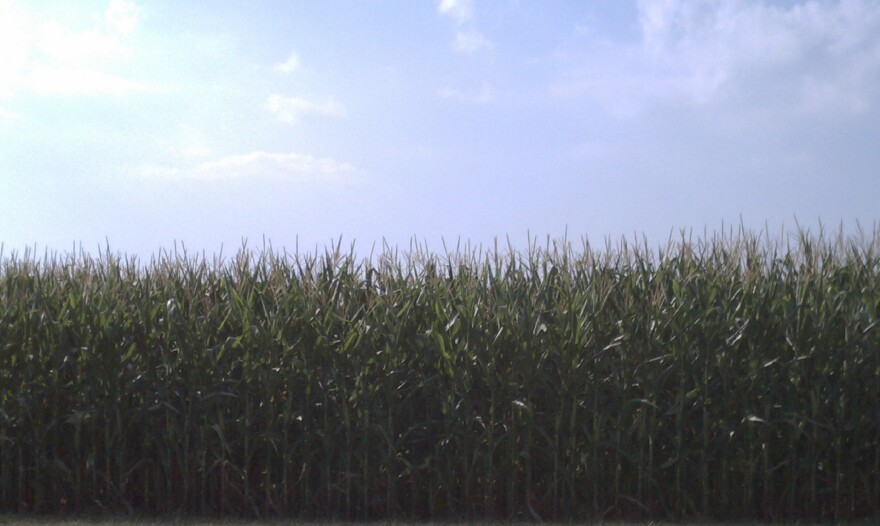Our Changing Gears road trip continues. Yesterday, I was in Kohler, Wisconsin. Today, I went down state in Illinois to Decatur.
Driving south from Chicago, it only takes about 25 miles to hit the corn fields. For the next 150 miles to Decatur, it’s a sea of yellow corn tassels, a head tall.
At night, the central Illinois darkness is broken only by the lights of the corn and soy processing facilities at Archer Daniels Midland Company.
At dawn, the truck and rail traffic starts rolling into the yards of ADM, one of the largest food processing companies in the world.
Its global sales were $62 billion last year. Its headquarters are in Decatur, as well as some of its largest processing facilities.
Its operations are so large that to tour all their plants, I had to get in a car.
ADM doesn’t grow crops, like those surrounding its operations in Decatur. It buys and sells crops – wheat, corn, soy and cocoa, from all over the world. Some of those crops are brought to processing plants, where they’re turned into products like corn syrup, vegetable oil, animal feed, or ethanol.
“This is the center of agriculture, and I joke a little, it’s the center because we’re here,” said Mike Baroni, a vice-president with ADM. “But if you look around, when you drove from Chicago you saw some of the most fertile land in the world, and corn and soybeans as far as the eye can see.
The company started its first plant in Decatur in 1939. Thirty years later, it moved its headquarters to Decatur, too.
Baroni said the company thinks of Decatur as its home: “We’ve been here a long time,” he said, adding that as far as he knows, the company has no plans to leave Decatur.
ADM has almost 4,500 workers in Decatur. While many of them work in the processing plant, the company also runs one of the largest private trading floors in the country and does a lot of scientific research.
That varied workforce should dispel any misconceptions people have about Decatur, the City Manager Ryan McGrady told me.
“We have a rich history of industry, so I think a lot of folks think we’re a dusty, old, blue collar city,” McGrady said. “It’s quite the contrary.”
When you talk about employers in Decatur, three names loom large: ADM, Caterpillar and Tate & Lyle, the British food giant that bought Decatur’s homegrown Staley Company in 1988.
(Interesting side note: today’s Chicago Bears were started as the Decatur Staleys in 1919, then moved to Chicago as the Chicago Staleys in 1920, where the NFL franchise was officially started.)
But Tate & Lyle is moving some research operations to the Chicago area.
And Caterpillar’s employment has been more cyclical. Over the past few years, it has laid off, and since rehired, hundreds of Decatur workers.
ADM’s been steady. Last fall, it bought a building in downtown Decatur to consolidate 300 IT, audit and accounting workers.
McGrady says that was a big deal.
“First of all, to have all that many more people in your central business district is going to be great for commerce,” he said. “But bigger than that was a sign of ADM’s commitment to Decatur by buying this building, especially in this age of downsizing.”
The unemployment rate in Decatur has dropped below 9 percent – better than Chicago’s jobless rate. McGrady says Decatur sales tax revenues are up 10 to 15 percent over the past year. That’s a faster rate of growth than Illinois as a whole.
With job prospects good in Decatur, welding classes are full at Richland Community College – even at midnight.
“Everybody seems to be in more of a hiring mode,” said Douglas Brauer, a vice-president with the college.
For spring semester the school started offering welding classes at midnight, to accommodate students who were working full-time. The class was full, so they offered it again this summer.
Richland Community College is literally in ADM’s backyard. When it was built, ADM built a pipeline to the campus to send steam. That has powered the college’s heating and cooling systems for the past 20 years.
I stepped outside with Andy Perry, who also works at Richland. He explained that we were standing directly north of one of the production facilities for Archer Daniels Midland, as well as northeast of Tate & Lyle.
“So on a given day, when some of those production facilities are giving off you steam and other elements, we can smell the products from here,” he said.
But Perry says nobody in Decatur minds.
“Really,” he said, “it’s the smell of money.”
That can only mean good things for Decatur, which likes to call itself the heart of agribusiness.



